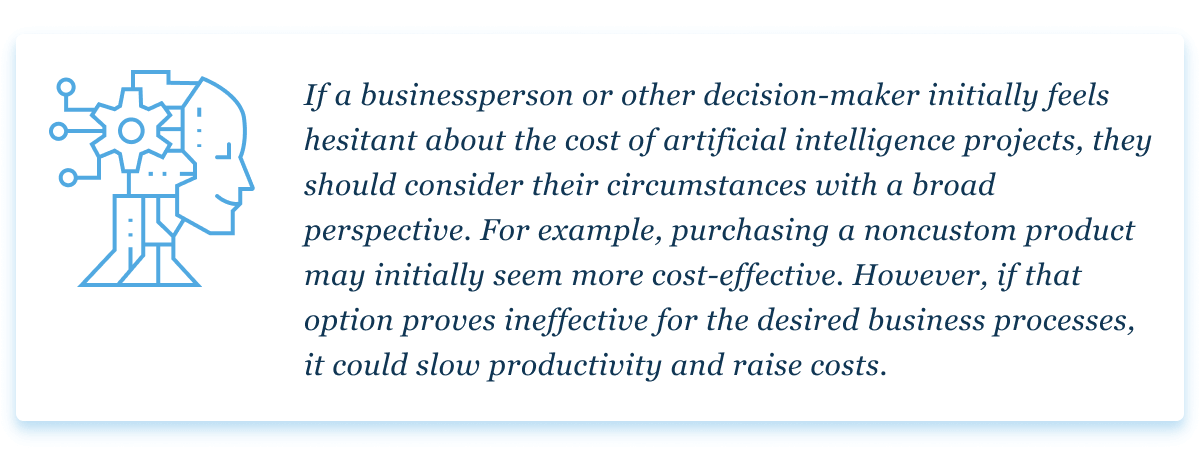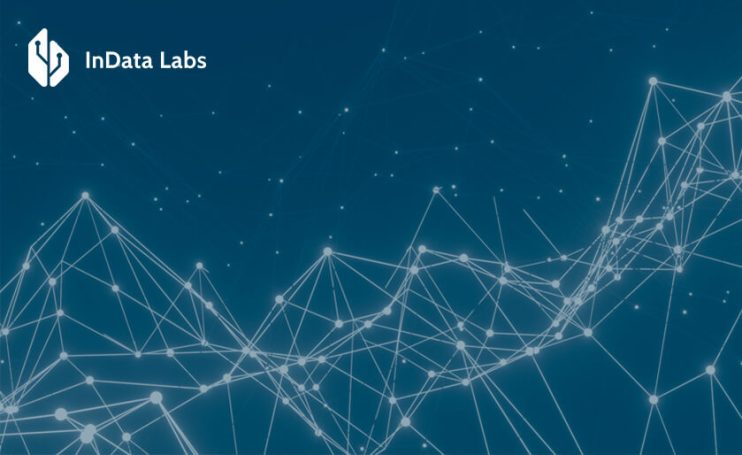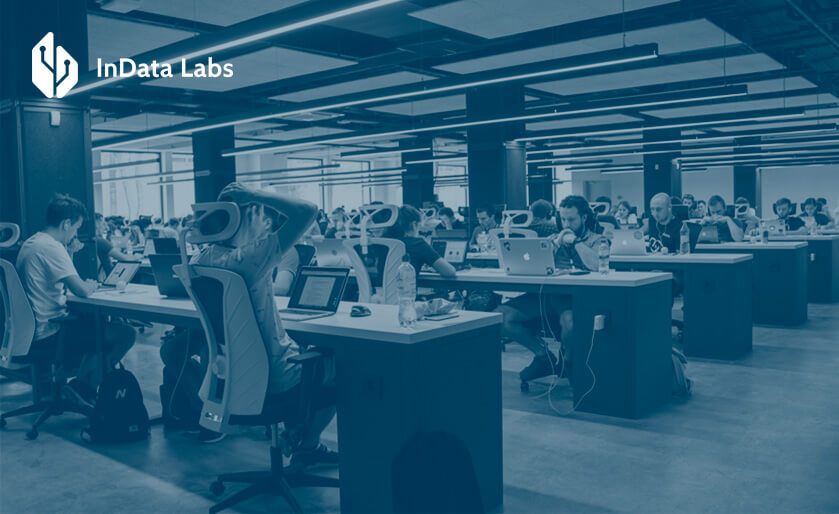Artificial intelligence (AI) has rapidly and dramatically changed how companies and industries operate. People apply the technology to various tasks and needs, so it’s no surprise that custom AI solutions are increasingly available. They allow a client to get an AI product that offers capabilities beyond what an off-the-shelf solution could.
Companies also often rely on bespoke AI to help their customers interact with services or products in ways ready-to-use options currently don’t. That’s particularly critical if artificial intelligence is one of a company’s main selling points and something that sets it apart from competitors. If AI is a core part of a business, it often doesn’t make sense to do anything but pursue customization.
Here’s a closer look at this custom-built technology and some compelling use cases that suggest AI solutions are the future.
Why are custom AI products superior to off-the-shelf options?
People on a limited budget, new to technology or otherwise hesitant to invest in artificial intelligence often initially focus on finding an already-built AI platform to meet their needs. However, there are several reasons why it’s frequently a better choice to use custom-made AI solutions.
Flexibility
Standardized options typically don’t provide the flexibility that custom AI development enables. Many people spend significant time researching the market and its products and find that everything falls short of what they envisioned.

Source: Unsplash
An alternative is to buy something already available and try to tweak it after purchase. However, that can cause the product to break or perform poorly. In contrast, people develop custom AI software with clients in mind. They can often work with an existing storage solution or business processes, shortening the overall implementation time.
More control
Going with something customized gives the client additional control over the implementation. They have direct input over the data used to train the AI system and retain ownership of that information.
Many commercialized and noncustom products arrive to the customer partially trained. Some people consider that a convenient perk. It can be, but it may also restrict how much a client can do with the AI product after starting to use it.
Better personalization and richer feature sets
Another advantage of custom AI-driven solutions is that they enable more personalization of a client’s required features. Perhaps it must be cloud-based and have computer vision capabilities. Those options and many others are all possible once someone begins working with a company or person with the appropriate expertise in custom artificial intelligence solutions.

Source: Unsplash
Ability to use highly specialized data
A client’s AI tool might need the functionality to support highly specialized data. Commercial solutions on the market may lack the advanced features to allow that. It’s highly likely that they’ll only perform to a certain extent and fall short of what company leaders need and expect.
Tighter security
One of the downsides of off-the-shelf products is that the companies behind them often develop them so fast that they reach the market with severe security flaws. Someone usually finds them sooner rather than later.
Security researchers uncover them in the best cases. They then alert the respective businesses, allowing IT teams to fix them before hackers exploit the weaknesses. However, cybercriminals may also be the first to find vulnerabilities. Such instances are often extraordinarily costly and damaging to everyone involved.
What are the downsides of custom AI software?
Despite the advantages mentioned above, a custom-built AI solution is not always the most appropriate option. That’s due to various reasons, many of which relate to a client’s resources, expectations and needs.
Higher cost
The services of an artificial intelligence solutions provider are often costlier than the expenses associated with an already-built option. That’s understandable, particularly since that person or company creates products closely aligned with a customer’s current and future needs.

Thinking of things that way often helps people realize that custom AI development is worth the higher upfront costs. They also frequently find the expenses easier to justify by requesting that the AI systems align with anything already used at the business.
Perhaps the company uses AWS or Microsoft Azure as a cloud provider. A service provider could develop an AI tool that also works in the cloud. In such cases, there’s a higher likelihood of the product working seamlessly, with little or no need to tweak existing technologies used at the organization.

Source: Unsplash
Potentially longer development time
AI products sold ready for use can start handling workloads almost immediately. That’s in contrast to the custom-built products that may take months or longer to develop.
However, people should remember that the most worthwhile products and services are often worth the wait. Opportunities exist for a professional to minimize the overall time frame, too. For example, they may use a development tool that speeds certain parts of the process.

Need for specialized expertise
Most companies need more in-house employees to develop custom AI software. Plus, many decision-makers assume it’ll take a prohibitively long time to source those experts for planned artificial intelligence projects.
Indeed, research indicates an acute skills shortage of AI professionals. People with relevant knowledge are in high demand, making it hard to convince them to work on specific AI solutions for clients looking to hire. However, an accessible alternative is to work with artificial intelligence professionals from an external company.
Relying on service providers specializing in AI software solutions requires clients to vet them and ensure they meet stated needs. However, it eliminates the need to write and publish job advertisements, hold interviews or go through the onboarding process with new team members.
Insufficient in-house expertise often prevents company leaders from choosing a build-your-own-AI tool. However, they can do something even better by working with outside service providers.
How do industries and companies use AI technology solutions?
Decision-makers are often more open to custom AI solutions if they know what possibilities exist. Here are some of the eye-opening applications of artificial intelligence within various sectors.
Retail
Today’s retailers face many challenges, especially if they operate online. These entities must catch potential customers’ attention, entice them enough to take the desired actions and leave people feeling that a given store is among the best options for meeting their needs.

Thus, an E-commerce retailer might have a custom application working in the background to show people relevant products based on previous purchases or indicators of interest. That’s a great and widely used way to keep people engaged and convince them the company has products they want and need.
Conversational AI is also gaining traction in the retail world. Studies indicate consumers like using self-service tools such as shopping chatbots.
People can interact with them at any time of the day or night. Plus, developers train chatbots to recognize and respond to many of the most frequent queries. The bots can answer questions in seconds, eliminating the need for people to spend time waiting on hold or describing their needs to a customer service representative on the phone.
Some options utilize natural language processing (NLP). They allow people to speak verbal commands or phrases to get what they need or want while shopping or otherwise engaging in self-service communications with retailers.

Source: Unsplash
Store brands that minimize barriers and friction within the customer experience are more likely to see ongoing loyalty. AI business solutions can support repeat visits and make shoppers more likely to recommend E-commerce sites or products to their friends.
Healthcare
Many people view AI applications in the medical field as potential game-changers for human health and disease management. Even the most advanced options require providers to exercise their judgment and expertise in patient care. However, combining a custom AI solution and a professional’s insights could open new treatment pathways, speed diagnoses and more.
For example, some deep learning applications can differentiate between healthy and cancerous tissue more accurately than trained experts. That doesn’t mean people aren’t needed to make the final judgment calls, but it can accelerate their workflow and result in fewer errors.

Source: Unsplash
A company called Kinsa Insights recently released a product to help pharmacies and other entities affected by seasonal illnesses better prepare for demand surges. It uses predictive AI to detect the signs of impending outbreaks several months in advance. It enhances sales forecasting and reduces the chances of companies experiencing overstocks or sellouts.
Companies also have AI technology solutions to improve post-operative care. Recovering from an illness often requires a patient to go through precise procedures at home to prevent complications. The instructions they get could include the following:

Poor post-operative care can make someone more likely to need hospital readmission. It may also mean it takes the patient longer to return to work, school or leisure activities.
However, some companies have products with algorithms that detect possible problems before they become severe. For example, they may spot wounds susceptible to infection unless people act promptly.
Most people prefer staying home when possible, which is more cost-effective for providers. However, this only works if home care proceeds as planned with few or no complications. AI solutions can help that happen.
Manufacturing
Manufacturing leaders must oversee companies while maintaining profitability, positive results and productivity. Many realize AI-based solutions can optimize business processes and improve competitiveness. That often happens when companies rely on machine learning algorithms to reduce the critical equipment downtime.
Smart sensors can support human technicians by collecting data about overall operating time, temperature, vibration, and other specifics related to machine performance and life span. Many of these artificial intelligence technology solutions work with an app that connects to a cloud platform. Factory floor leaders can get equipment statistics even if they’re hundreds of miles away from a manufacturing facility.

Source: Unsplash
These AI business solutions often shorten troubleshooting time, too. They might send equipment statistics to a technician the day before a scheduled appointment. The professional then has a better idea of what to examine on arrival to remedy a problem.

Statistics show that, as of 2020, 59% of manufacturers used AI for better quality control. The technology can reduce error rates and even prevent mistakes.
Personal wellness
Societal changes have encouraged many people to pay more attention to self-care and wellness. They often participate in activities such as meditation or yoga, trying to manage stress rather than letting it get out of control.
Another positive change is the reduction of stigma surrounding mental health. When people feel depressed, anxious or otherwise not OK, they’re more likely to confide in friends or professionals instead of keeping their feelings bottled up and hidden from the world.
Numerous companies have capitalized on these improvements with bespoke AI solutions that help people take better care of themselves. Some companies use personalized AI platforms to suggest which vitamins an individual should take based on age, health needs and other factors. Such options enable providing better customer support through targeted products.
There’s even a New York-based company called Aescape that uses data-driven AI to operate its specialized massage machine. Customers can specialize areas of the body to focus on or steer clear of, plus choose desired treatment lengths. The equipment improves its performance with use, increasing the chances of people getting the right treatments and making future appointments for these pioneering AI services.

Source: Unsplash
Researchers are also interested in the app-based reduction of bad habits. Most people have at least a few behaviors or activities they’d like to stop or minimize for better health, from smoking to drinking too much alcohol. Many habit-breaking applications feature custom AI development working in the background to keep users motivated or prevent relapses. Personal wellness offerings don’t replace health care, but they supplement it.
These are only some of the many industries tapping into the abundant possibilities of artificial intelligence. People interested in following their lead should strongly consider developing a clear AI strategy, preferably with the support of seasoned professionals.
Is custom AI development the right choice?
This overview shows why a growing number of clients pursue custom AI solutions to address identified needs. However, no single AI product or company is universally best for everyone.
Thinking about the following areas for discussion can provide further guidance for making the most appropriate choices:

Mentioning these matters when speaking to AI development service providers will also set expectations and help them correctly understand business needs.
Purchasing custom artificial intelligence solutions is a much more involved process than buying something off the shelf.
However, the extra time and effort often become apparent through measurable business results and improved competitiveness. It’s an option well worth exploring, even for people and companies not yet accustomed to using artificial intelligence.
Author Bio
April Miller is a senior writer with more than 3 years of experience writing on AI and ML topics.
Custom AI solutions for your business needs
Looking for a trusted technology vendor to develop a bespoke AI software? Book a meeting with our consultant.



